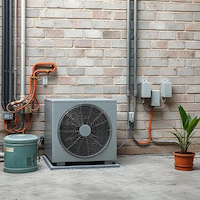

Indoor air quality (IAQ) plays a significant role in your health and well-being. Poor air quality can lead to respiratory problems, allergies, and an overall decrease in comfort. Many homeowners underestimate the importance of clean air and the impact it has on daily life. Fortunately, there are effective ways to improve indoor air quality and create a healthier environment for you and your family.
In this article, we’ll discuss the importance of indoor air quality, practical ways to improve it, and why you should always work with an HVAC company verified by nhvac.org to ensure your system is properly maintained.
The air inside your home can contain pollutants such as dust, pet dander, mold spores, and volatile organic compounds (VOCs) from household products. Poor indoor air quality can lead to:
Respiratory issues – Pollutants can cause or worsen conditions like asthma, bronchitis, and allergies.
Fatigue and headaches – Exposure to poor air can lead to fatigue, dizziness, and frequent headaches.
Worsened allergy symptoms – Indoor allergens can trigger sneezing, congestion, and watery eyes.
Long-term health effects – Prolonged exposure to certain pollutants can increase the risk of chronic illnesses.
Taking proactive steps to improve air quality can lead to a healthier and more comfortable home environment.
Your HVAC system plays a major role in filtering out pollutants from indoor air. However, a dirty air filter can restrict airflow and allow dust and allergens to circulate.
How often should you change your air filter?
Every 1-3 months for standard filters.
Every month if you have pets or allergies.
Every 6-12 months for high-efficiency filters.
A verified HVAC company from nhvac.org can recommend the best filter for your home and ensure it’s changed at the right intervals.
Air purifiers help remove airborne pollutants, including allergens, bacteria, and odors. HEPA (High-Efficiency Particulate Air) filters are the most effective for capturing small particles.
Consider placing air purifiers in:
Bedrooms – Improves sleep quality by reducing allergens.
Living areas – Keeps dust and pet dander levels low.
Kitchens – Helps filter out cooking odors and smoke.
Proper ventilation reduces indoor pollutants by bringing in fresh outdoor air.
How to improve ventilation:
Open windows and doors whenever possible.
Use exhaust fans in kitchens and bathrooms to remove moisture and contaminants.
Install a whole-house ventilation system for consistent air exchange.
High humidity encourages mold and dust mites, which can negatively impact air quality. On the other hand, low humidity can cause dry skin and respiratory irritation.
Ideal indoor humidity levels:
30-50% humidity is optimal for indoor comfort and air quality.
Use dehumidifiers in damp areas to prevent mold growth.
Use humidifiers in winter to prevent excessively dry air.
Regular cleaning reduces the buildup of dust, pet hair, and other allergens.
Cleaning tips for better air quality:
Vacuum carpets and rugs at least once a week using a vacuum with a HEPA filter.
Wash bedding and curtains regularly to remove dust mites.
Dust surfaces frequently to prevent particles from becoming airborne.
Smoking indoors significantly reduces air quality. If you or someone in your home smokes, consider:
Smoking outdoors to prevent indoor pollution.
Using an air purifier designed for smoke removal.
Eliminating the use of aerosol sprays and strong chemical cleaners.
Many household cleaning products contain VOCs that can harm indoor air quality.
Safer alternatives:
Vinegar and baking soda for cleaning surfaces.
Plant-based or non-toxic cleaners.
Essential oils instead of chemical air fresheners.
Certain indoor plants can naturally remove toxins from the air. Some of the best air-purifying plants include:
Snake Plant – Filters out formaldehyde and carbon monoxide.
Aloe Vera – Absorbs benzene and other harmful chemicals.
Spider Plant – Reduces indoor air toxins like xylene and toluene.
Your HVAC system plays a critical role in maintaining indoor air quality. Dust, mold, and debris can accumulate in ducts, vents, and coils, reducing efficiency and spreading contaminants.
Regular HVAC maintenance includes:
Cleaning and inspecting ductwork.
Checking ventilation systems for blockages.
Ensuring proper airflow and filtration.
A verified HVAC professional from nhvac.org can perform regular system tune-ups to ensure optimal air quality and efficiency.
Radon and carbon monoxide (CO) are invisible, odorless gases that can pose serious health risks.
Radon testing ensures your home is free of harmful radioactive gas.
CO detectors should be installed near sleeping areas and regularly checked.
Your HVAC system is the backbone of indoor air quality. Without proper maintenance, it can become a source of air pollution rather than a solution.
Hiring a verified HVAC professional from nhvac.org ensures:
Expert system evaluation – Technicians check for airflow problems, leaks, and contaminants.
Proper installation and upgrades – A well-maintained system improves air filtration and humidity control.
Compliance with industry standards – Verified professionals follow best practices for clean indoor air.
Improving indoor air quality is essential for a healthier and more comfortable home environment. Simple steps like changing air filters, increasing ventilation, using air purifiers, and reducing indoor pollutants can make a significant difference.
To maintain long-term air quality and efficiency, it’s crucial to schedule regular HVAC maintenance with a verified HVAC company from nhvac.org. By taking these proactive measures, you’ll ensure clean, fresh air for your family while maximizing the efficiency of your heating and cooling system.

Quickly increase the confidence of visitors to your website with our trusted HVAC Contractor verification seal & customer feedback & reporting system.
Thousands of consumers across our network trust our research and reviews every single day.
Pass NHVAC standards and proudly display our Trusted seal on your website to show customers you are committed to customer safety and security and value their business.